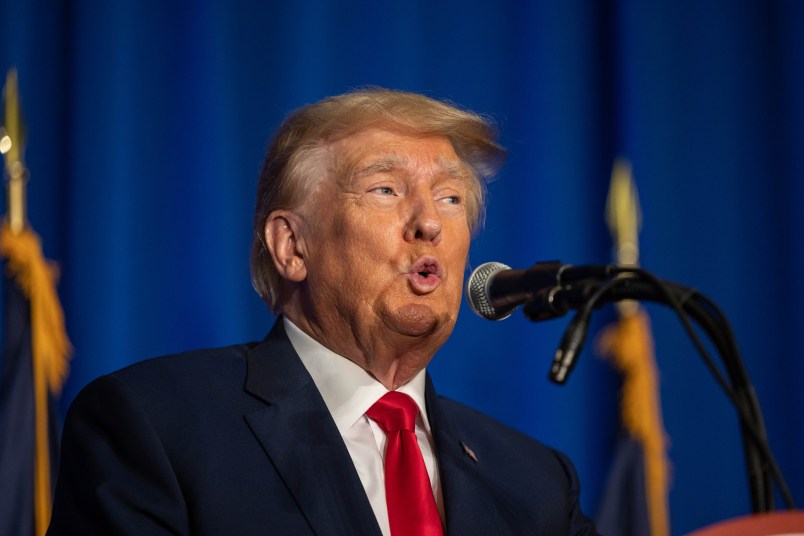Attorneys for former President Trump asked a federal judge on Monday to allow him to share a large part of materials from the election reversal case against him in a filing which leaned heavily on talking points familiar from right-wing media and Truth Social.
Lawyers asserted in the case that U.S. District Judge Tanya Chutkan for the District of Columbia was putting Trump’s “due process rights” at risk by giving him tight deadlines to reply to government motions. They also described the case as made up of “false allegations” that were levied against the Biden administration’s “primary political opponent,” and elsewhere cited “the frequency of apparent leaks from the Special Counsel’s office.” At one point, Trump attorneys included a video in which Joe Biden drinks a cup of coffee from a “Dark Brandon” branded mug, saying it shows how Biden has “capitaliz[ed]” on the indictment.
At its core, however, the filing asks Judge Chutkan to rule against the special counsel on a relatively routine protective order before the government turns over its first batch of discovery in the case.
Federal prosecutors with Special Counsel Jack Smith’s office had said that they wanted a protective order barring Trump from being able to publicize any of the evidence they plan to send to his attorneys, citing among other things a Friday evening Truth Social post in which Trump wrote “IF YOU GO AFTER ME, I’M COMING AFTER YOU.”
On Monday, Trump’s attorneys said that they want only “sensitive” materials to be barred from disclosure, and also asked for the judge to allow the materials which are protected to be shared with a broader category of people. That includes “volunteer attorneys” and “others without paid employment arrangements” that Trump, ever a lover of informal arrangements, and his lawyers might want to hire.
Trump’s attorneys filed an attached, edited version of the government’s motion that they want Judge Chutkan to approve. They also attached a backup version should she rule against them on the first one.
Under that, Trump included an ask: that witness interviews which took place outside of the grand jury be available for disclosure. That could allow Trump to reveal who spoke to prosecutors, and about what, outside of the grand jury.
Much of the filing avoids legal argument to instead repeat many of the same talking points that Trump himself has hit in recent commentary on social media: that the case took too long to be filed, and is therefore politically motivated.
Trump’s attorneys also suggested that Judge Chutkan’s efforts to keep the pace of the case humming along in its early days amounted to a potential violation of their client’s rights. Prosecutors had said that they’re ready to send evidence to Trump’s attorneys as soon as a protective order was agreed on, a standard procedural issue in criminal cases. Attorneys for Trump used Chutkan’s schedule, demanding a response to the government by 5 p.m. Monday, to say that the speed was “a concerning development, inconsistent with his due process rights.”
The theme of free speech runs throughout the filing, as far as that issue remains from the substance of the election reversal case.
At one point, Trump’s attorneys dismiss the DOJ’s position as “prior restraint.” In explaining Trump’s “COMING AFTER YOU” post, they say that it was merely “generalized political speech.”
The indictment, which alleges a wide-ranging conspiracy to reverse the results of the 2020 presidential election, is circumspect in delineating what constituted protected speech and opinion by Trump, and where it departed from that into criminal conspiracy.



